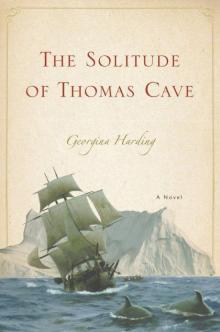- Home
- Georgina Harding
The Solitude of Thomas Cave Page 2
The Solitude of Thomas Cave Read online
Page 2
He did not tolerate others easily, Mister Carnock. William was a harmless fellow, a shy one at heart I think who talked to fill a silence or to entertain and never meant to upset a soul. Yet more than once I saw Carnock take issue with him on the accuracy of his tales. I saw no need for that, nor did any other of us. I believed that the things he told us were substantially true, that he did indeed have an exceptional eye and ear for the wondrous, yet that is not to say that I did not at times suspect that his marvels had grown at the least a little more marvellous in the telling.
It was another story of William's that night that set off the wager. It all came out in passing, as such things do. Neither William nor any one of us might have predicted the consequences of what he was to say, which was the mention only of how he had met in Amsterdam a Dutchman who claimed to have lived an entire year on Jan Mayen - this was an island much frequented by the whalers of that nation and some distance to the south of where we were. And this was a story which I believe William told very straight. Indeed, I think he needed no embellishment for the plain facts of it were strange enough to catch the mind.
It would appear that the crew of this Dutchman's whaleboat had been left accidentally stranded at the end of a late season, unable to rejoin the ship as it escaped the fast-closing ice, and they had no choice but to upturn the boat and make a house out of it and try to endure there through the dark months of winter, contriving a stove somehow and hunting down whatever scarce game was to be found, but meagrely, until one by one they succumbed to scurvy and the body of each was disposed of in turn, laid out on the frozen soil and covered over with rocks as was the sailor's common way of burial in those places, or wedged into some crevice inaccessible to scavenging bears, until there remained only this single man, an exceptionally wiry and determined fellow who would not stop for the scurvy to take hold but sought endlessly all the long spring for fresh food, for bear and game and the bitter but lifesaving grasses that were at last uncovered beneath the snow. When he was found by a returning whaler he was barely alive, barely able to drag out from beneath the boat the body of the last of his companions and lay it wrapped tight in sailcloth on the beach. And at that season's end they had brought him home and now he would not go back to sea but lived raggedly by the portside in Amsterdam, making his home again, but not such a cold one, in a capsized boat, and supported by those to whom he told his tale so that he need never seek out a hunk of bread or a drink again.
Carnock laughed at that point, a lone hard laugh. 'And what did you give him for his fine tale?'
William looked about, surprised at the intervention. 'What I could. It's not so far off a possibility that I could not imagine such a thing might befall to myself, to any one of us here. Of course I gave him something.'
'God's Truth, William, I'll wager you did, and every guilder of it was tricked out of you. You of all men might have seen through such a fraud,' said Carnock, with that scornful way he had that could make even the least criticism he spoke come across like an insult. How he survived so long as Mate, with that aggressive manner and the power he had over us, sometimes amazed me, that he was not found some day beaten in an alley round the back of some harbour or simply gone overboard in the night.
'What do you mean by that?' William came back, and Carnock did not see fit to stop there.
'I had thought, William Sherwyn, that a man such as yourself was especially well placed to recognise the invention that goes into the telling of tales.'
At that William bridled. Like many talkers, he was a nervous man, slight and quick, precise with his hands and his tools, and he had a ginger temper to him. I would not have given much for his chances against a man the size of Carnock if it had come to a fight. Yet it did not come to that for Cave intervened, intervened with a quiet authority that directed all attention on to him and let William shrink back small and soon forgotten.
'I have met this fellow myself, heard him talk. I am convinced of the truth of his story.' Cave's voice came through strong, all the richer for being not too often wasted.
Carnock turned to find Cave's face across the fire. 'What are you saying, man? You have experience of these regions. You know sure well as I do that no man of flesh and blood lives a winter this far north.'
'And yet it is my conviction that he spoke the truth. I heard the details of his story and I saw the look in his eyes.'
'Then he's a fine actor and a finer liar than our friend William here. Because any fool knows that what he says is an impossibility.'
'Not at all.' Cave spoke calmly against the Mate's swagger. That calm in his voice gave it power, and I was drawn to it and forgot all else as it ran on into philosophy in that stark midnight light. I remember the eeriness of the light and the coolness of his voice: 'A man never knows what is or is not possible until he has tried it.'
'Some things a man is wise enough not to try.'
'Men who think like that gain no wisdom. They have beliefs, prejudices, superstitions; they may think they have certainty but they have no wisdom. Wisdom lies in finding out for yourself.'
Carnock was losing his depth. 'Say what you like, any man left a winter up here would be mad by Christmas and dead by New Year. Mad from the cold and the dark and the lights in the sky, dead from scurvy and starvation.'
'Not if he is strong and free from fear. If he cleanses himself of superstition. If he is a practical man, if he has reason and self-discipline, and if he has God's help and a little luck.' There was something elevated about the way Cave spoke, as if he knew something we did not, like the priest in the pulpit with the ignorant populace beneath him. Carnock did not like to be spoken to in such a way.
'In God's Name then, do it yourself.'
'I might.'
'You might? The scorn in his word cracked the air. 'Hear that, lads? Our Mister Cave says he might spend a winter here.'
Every one of us fell still then. Slowly chat and movement had been dying down as all the rest of them came to take notice of the argument. Now in the pause not a man moved and you could hear the burning of the fire before us. The flames were bright, the smoke carried the fishy taint of blubber. Even on a summer's night we each of us knew inside the fear we had of those lands. Even on the brightest morning when the sun's rays came hot through the thin air and burned our faces and we worked in our undershirts, we had the sense that this was not a place that God had made for man, that no man surely was meant in His plan to set foot on its land or sail its seas, that we were overbold to come there and hunt in the way that we did. In this place the very days did not have the form God had given them in the habitable regions, nor the seasons either, it being possible to experience the most extreme cold and blizzard even at the height of August; in its heavens we saw weird apparitions and lights that were not meant for our eyes, and in its sea we saw extraordinary beasts akin to the creatures of myth. Recognising that, we were touched with dread even when the sun shone, and each day we spent there in the North came to seem a transgression. To suggest remaining an entire year seemed the utmost temptation of fate.
Only Thomas Cave showed no awe of the place. His voice ran on into our silence, easy as if he spoke not there but on some mild English shore.
'Yes, I say that, with God's help, I could spend a winter here.' And he looked about him, at the pale night, the mountains, the slatey sea of the bay with the Heartsease at anchor.
'You'll die a fool'
'Better than living a fool,' said Cave, and I believe that the sting in his words was meant as much for himself as for Carnock but Carnock of course did not see it that way.
'Do it then, Devil take you. What do you say, lads? We'll leave him ship's stores, musket, powder, all he thinks he might need. And when we come back next year we'll see if he's still warm.'
And so the wager was made. He drew us in, Carnock, for we all were sided with him and against Cave on the one matter of which we were sure: that no mortal man might live out the winter there. From one to the other of us he looked, and said, y
ou'd bet it wasn't possible, wouldn't you? And of course we meant that it was an impossibility but we did not intend that anyone should take up the bet. It was an argument, theoretical, fed by the drink and the lightness of the night, no more. And yet there, with the sun bleeding low over the horizon and the fire warm on our faces, it took on practical reality. Ten of us, ten pounds each man, a hundred pounds in all.
The day before we sailed was one of those bright ones when the atmosphere alone is sharp enough to etch itself on the senses and the memory. No need for that, since I was already tight with anticipation of our parting. In those few weeks I had come to admire Cave more than any man, more even than Marmaduke, not for any heroics but for the bare dignity in him and the calm with which he looked ahead. I think that I was moved the more because of our common past which gave me sight of the humanness of him; but for that it is possible that I might have taken his impassivity for hardness and judged him without warmth of either flesh or heart.
We took a short walk that last day, took what brief time as other things allowed. Cave had sought me out. I and some others had helped him stow the provisions the Captain had allotted him for the winter in the cabin that was to be his home, and a generous enough supply it was: hogsheads of oatmeal and barley, casks of beer and oil, breads, bacon and cheeses, salt, brandy, spices, all that the ship could spare to be left behind, such a variety of things and such a quantity that the narrow cabin came to resemble nothing so much as a grocery shop. And when all was done, and the three muskets that he was to be left with and sufficient powder also safely and dryly put away, he singled me out and had me come with him.
We walked up the back of the beach to a place in the valley where there was a small dark tarn round and brown as a cow's eye. Earlier I had seen snipe there, surprised them from the surrounding bog and known them in the instant by their sudden zigzag flight, but the birds had gone.
'Flown south,' Cave said.
'Jonas Watson says they are the same birds we see at home, that they come here as we do only for the summer.'
'Could be.'
'Reckon it gets too cold for them soon. They'd die of cold.'
And as I spoke the thought stabbed me like a snipe's curved beak, and I wished that I had not said the words.
The brook that ran down from the tarn burbled faintly, its water and its little cascades soon to be silenced beneath a glassy casing of ice. So silent it was there, heavy with the intense quiet of inland, the calls of gulls and of men loading ship carrying now and then wavering and thin from the sea's edge.
Cave had planned what he would say.
'I'll have you take my share, boy. I have written it over for you, given my paper to the Captain. My portion of the sale of the oil and the whalebone. Also of the unicorn's horn. The value of that is hard to tell but, believe me, it is great. It is inestimably rare, said to be a most powerful antidote to poisons though of course I have no experience, no proof of that. I have heard that such a horn may trade for twenty times its weight in gold. See that the Captain deals fair and gives you all that is due to me.'
His was the largest share of this since it was he who had found the skull, on the strand line of a narrow beach beyond the mountain north of our bay, the skull of a strange beast with this one huge whorled shaft, a full eight foot long, projecting from it.
'No, sir,' I said, unable to admit this favour from the man whose fate seemed so inevitable before me. 'I will not take it. I will hold it for you.'
'Take it, Tom. Invest the money well. You are young. You may use it to build a future. A few good voyages and you may yet have your own ship, you never know, or if you choose, a place on land.'
'Till next season, I will hold it.'
'No. You will take it for your own.'
I gave in before his determination. If he needed to hear me speak so at that moment I would do as he desired. What would occur when I returned the next year, if by some wonder or magic he had survived and I found him there, would be another matter.
'Good.' He put a hand to my shoulder, looked at me clear. Though I was pretty much as tall as he already I had the feeling when he stood before me like this that I was looking up to him.
'But, Sir, won't you be needing it, next year won't you have need of it?'
His smile creased no more than the corners of his eyes. 'You forget that I will have the wager.'
THE EXPERIENCE OF
THOMAS CAVE
An uncharted island of Svalbard, the winter of 1616-17
2
IN THE LIGHT of the North distances deceive. The stationary man watches the ship depart, so slowly that the steely band of water before it can barely be perceived to extend. The clarity of the Arctic air is such that even when the ship is far off, sails, masts, details stand out sharp to the eye as if they were still close in, and he has the impression that he could yell out and call back a boat long after all on board are out of earshot. Though he does not will it, a cry of a kind eventually escapes him, a cry that comes as much from the heart as the lungs, and that is swiftly swallowed into the lap and draw of wave on shingle.
At last a single sound comes back to him, a cannon shot that by its faintness confirms just how far the ship has travelled. As if he did not know. He has spent enough time in these seas to recognise such effects of the atmosphere. He has seen an experienced pilot stand to some three or four hours from the shore for fear of running on to rocks that appeared alarmingly close to his eye; then, too, with a slight change in the air, he has seen land appear to recede before an approaching ship, retaining the same clarity and proportion for many hours though the wind would seem to drive towards it, so much so that sailors have become spooked and spoken of being held back by some hidden loadstone beneath the sea. In these regions a man cannot always trust his eyes but must turn to reason and calculation to determine what is before him. And Thomas Cave feels the wind on his cheek, a light breeze coming off the land behind him, cold from the north, and knows that it is taking the ship away though she seems quite still out there in her silence, a fine outline that holds each time he looks back to it, that does not appear to diminish but in the end only to dissolve, all at once, as the luminosity itself disappears from the horizon. He gives a little shake then as if a cloak has been taken off him, looks about him alert as if he has just perceived the cold, the tent behind him, the fact that it is about to be dark. Beyond these simple observations thuds a deeper knowledge which his mind is momentarily unable to process: the enormity of what he has elected to do.
He raises his chin as if to open the passage of his throat so that he can breathe the better, makes a slow inhalation and holds it down until the thought is quelled.
Then he puts his back to the sea and the absence of the ship and begins to walk up the rise of the beach. After a few steps something catches his eye. He bends to take up a stone, a slim grey disc of granite. He weighs it in his hand, sees how fine and perfect it is, how neatly it fits into the curve of the thumb and forefinger as if it were made to lie there, and then he turns again, towards the sea now, puts his side to the waves, curves his back and arcs his arm behind him. With a whip of his wrist he lets the stone fly, on a horizontal trajectory so that it does not strike water until it is many yards out from the wave edge. Once, twice, again and again it skims the dark surface, eight times in all.
Emptiness so resounds about the whale station that it might have been abandoned not for hours but for years. Only the smell, at once cloying and rancid and sooty, and the sheen of grease that holds to every surface testify to its recent use. Even to the man walking back there these structures seem alien: the vats, the cauldrons and boilers, the great low tent of sailcloth that was warehouse and workshop and is now, with a fine string of smoke above it grey before a greying sky, to be his home. Not two decades since this land was known and already man has placed his mark upon it, set down in the wilderness works of a solid, squat ugliness that will never in a hundred years belong. Yet God, he has no doubt, is patient. God will k
now how small and how feeble are the works of man. How all this will return to ashes and dust. A little way off, spread beside the shoreline, lie the remnants of the carcases of a dozen whales, heaps of bones with a raucous multitude of gulls still picking and screaming amongst them, milling beneath the great white jawbones like the congregation of the damned beneath the arches of a fallen cathedral.
Their racket recedes as he enters his inner chamber, closes behind him the thick wooden door that itself weighs like the door of a church. His hermitage. He kneels before the stove and throws on a slab of blubber that spits and flames up in the half-light. Only that morning there had been a gang of men at work in the room. There was noise, crowding, the stink and warmth of labouring bodies. They had helped him to build the wooden cell inside the walls of the tent, hammering planks, pouring sand. Their absence now is all the more tangible as here in the enclosed space even more than outside their smell remains, an animal reek of bodies and sweat and fish oil, a fetid den smell that he notices only now that they are gone.
The room is barely ten foot square, the stove at the centre of it, the smoke drawn up through an opening in the ceiling funnelled with sailcloth. It is part underground, the floor dug down through the sand to the underlying rock, and the walls above ground are thick, made from two layers of close-fitting deal planks and the cavity between them filled with sand, buckets of the stuff, until a sprinkling of grains welled out between the flaws in the plank seams. It was, he thinks, a satisfactory labour. Insulated in this way the walls will not permit the penetration of the sharpest wind or blizzard however it may swirl about in the tent space beyond; and so muffled it is within the chamber that when he falls still there is only the companionship of the fire to keep him from the sense that he is deaf.

 Harvest
Harvest The Gun Room
The Gun Room Painter of Silence
Painter of Silence Land of the Living
Land of the Living The Spy Game
The Spy Game The Solitude of Thomas Cave
The Solitude of Thomas Cave